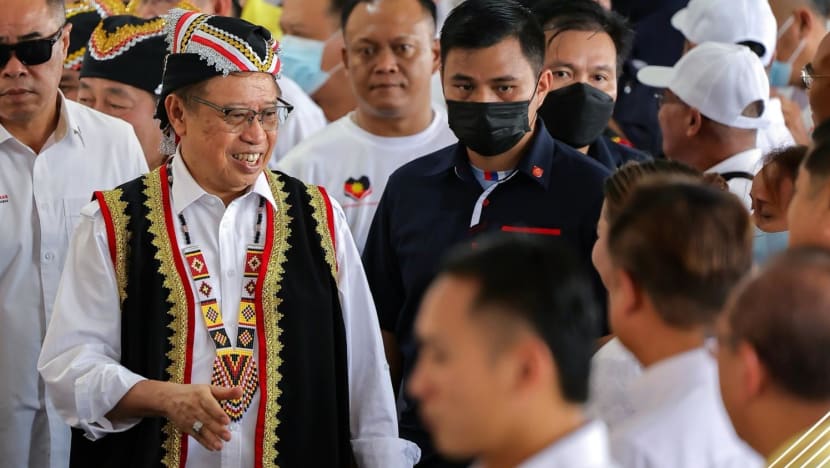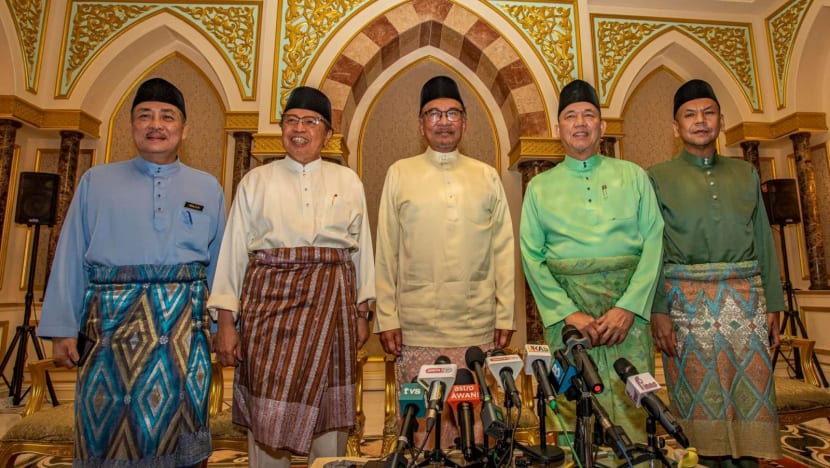Commentary: Sarawak’s rising autonomy is hard to stop
Sarawak’s demands come at the back of not only kingmaking political power but also statecraft prowess that makes federal resistance harder, says political analyst James Chai.

Sarawak Premier Abang Johari Openg after officiating a Sarawakku Sayang Program in Siniawan Town, Kuching on Nov 16, 2022. (Photo: Facebook/Rushdan Manan via Bernama)

This audio is generated by an AI tool.
KUALA LUMPUR: Sarawak’s Premier, Abang Johari Openg (popularly known as Abang Jo), comes from one of the most powerful political families in the country.
His father, Abang Openg, was the first governor of Sarawak and played an instrumental role in the establishment of Malaysia, whereas Mr Abang Jo’s second great-grandfather, Patinggi Abdul Gapor, was a British-era governor. Mr Abang Jo’s lineage also traces back four generations to Patinggi Ali, who was regarded Sarawak’s “earliest national hero”.
Yet, Mr Abang Jo had to wait 36 years - assigned mostly to small-time ministerial roles of tourism, housing, and industry in the interim - before he rose as Sarawak’s premier in 2017. His political career matches Sarawak’s ambitions in restoring its rights as one of three regions in Malaysia, rather than one of 13 states.
The most recent appeal is for national oil corporation, Petronas, to surrender all natural gas rights in Sarawak to Petroleum Sarawak Bhd (Petros). This process started as early as mid-2017 when Mr Abang Jo formed Petros, scrutinising the law including the Petroleum Development Act 1974 (PDA 1974), and started negotiating with Petronas for Sarawak oil and gas rights.
Sarawak’s primary assertion is that the colonial-era Oil Mining Ordinance 1958, which gave Sarawak regulatory control of its oil and gas, could co-exist with PDA 1974, which many interpret as giving sole and absolute authority to Petronas.
While this is arguably the most consequential action by Sarawak to restore its rights - Sarawak is the largest natural gas producer in Malaysia and Petronas’ earnings will likely be affected - it is by no means the only.
ONE STEP AT A TIME
When the Barisan Nasional (BN) government lost for the first time in 2018, Mr Abang Jo made a strategic decision to consolidate all major Sarawak parties to form the Sarawak Parties Alliance (GPS) coalition. This move had twin benefits: Consolidation gives it more bargaining power as a kingmaker at the federal level, and a “Sarawak First” regionalism strengthens its domestic control.
By having the coalition’s Wan Junaidi as the Minister of Law in 2021, GPS pushed through substantive reforms to its favour, including a constitutional amendment to redefine “federation”, elevating Sarawak’s status in Malaysia. Since then, nomenclature changes followed: “Chief Minister” of Sarawak was elevated to “Premier” in 2022, and the word “state” was dropped from legislative institutions and government departments.
When Mr Anwar Ibrahim took over as Malaysia’s prime minister in November 2022, GPS senior leader Fadillah Yusof was appointed second deputy prime minister - the first Borneo leader to do so - besides assuming the senior portfolio of energy.

GPS successfully transferred the Bintulu Port from the federal government to the Sarawak government, and gained Mr Anwar’s support to take over ownership of MASwings airline. This year, another nine fundamental demands pursuant to the Malaysia Agreement 1963 (MA63) - a founding document that bases Borneo regions’ grievances - have been resolved.
In most cases, Sarawak’s claims operate at the margins - carving its differentiation without directly usurping the federal powers. An example is education, where it complies with the federal policies including using Malay language as the national language, but adding English for its students as a localisation measure.
A regional coalition is a kingmaker in times of political fragmentation, which started in 2018 and will continue in the post-BN era. However, it is not merely its political kingmaking ability that explains its rising autonomy, but also Mr Abang Jo’s vision and force of personality that makes it hard to deny its claims.
FUTURE PLANS FOR SARAWAK
Mr Abang Jo’s plans for Sarawak in digital economy, renewable energy, and regional institutionalisation looks markedly different from Taib Mahmud’s 33-year rule. The latter, as the longest-serving chief minister, was a Sarawak focused on heavy industry and forestry, mired with scandals of cronyism, land grabs, and wealth accumulation.
In contrast, Mr Abang Jo used the RM12.4 billion (US$2.8 billion) revenue - the highest among states in Malaysia - to build growth industries in hydrogen, solar, biomass and semiconductors. Additionally, he also introduced many firsts among states: Sovereign wealth fund, state commercial bank, recognising the United Examination Certificate (UEC) and the Unit for Other Religions (UNIFOR) for minorities.
While many of the plans, like hydrogen and semiconductors, are still at the infancy stages, the industry and its people have responded kindly. In 2023, Sarawak recorded RM22.8 billion in approved investments, and Sarawakian talents are showing openness of returning home.
Mr Abang Jo also has a few tailwinds for early success: World Bank findings classify Sarawak as a high-income state, and GPS holds the highest-ever majority of 80 seats in the Sarawak State Legislative Assembly compared with the opposition’s two seats.
GPS’ political dominance will likely persist as Mr Abang Jo rakes gains in what matters most to Sarawakians: Restoring rights in tandem with MA63. As long as he continues on this track, the case for devolution will also become harder to resist. Though this may not translate to other states’ demands as Sarawak’s case will always be unique given its history and legal claims.
In cementing his personal legacy, Mr Abang Jo will likely stretch his demands, and wait patiently for the ones he has yet to obtain. Either way, Sarawakians will see him as a leader who went the furthest for them.
After all, he has waited decades to become premier. He can afford to wait a little longer.
James Chai is a political analyst, columnist and the author of Sang Kancil (Penguin Random House).

















